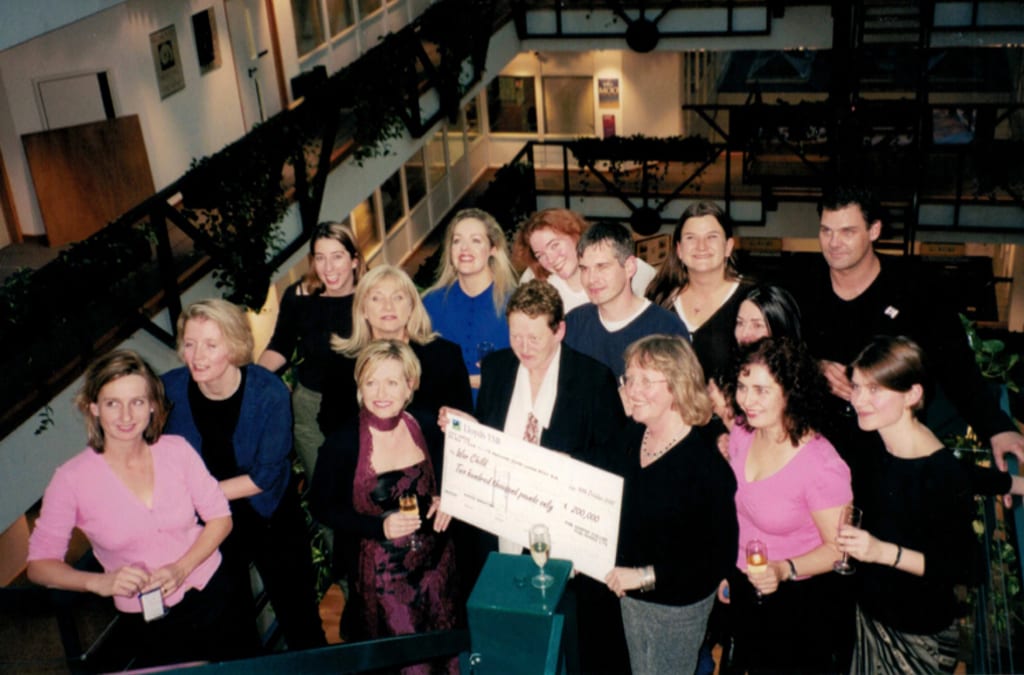Since 2000 The Girls Night In, Boys Night In, Kids Night In and Big Night Out books have generated income for War Child (www.warchild.org.uk) of over 1.1 million pounds. We are also very excited about the fundraising possibilities around the release of Midnight Feast in 2007.
The money these books have raised has enabled War Child to help a vast number of children in many of the world’s least safe, most violent places. This help has taken the form of practical on-the-ground action and, increasingly targeted campaigning work: lobbying government and influential institutions to change policy and institutionalise long-term change for the better for the children War Child works with, and the Night In series has benefited.
2000 – 2004
Between 2000 and 2004 War Child, with the support of funds raised by the Night In series, worked in most of the major sites of conflict around the world. Some of our notable programmes included
mass feeding projects in refugee camps in Iraq and Afghanistan an education programme for orphaned children in rural Rwanda – these children were given wind up radios and schools programmes were broadcast to them Music therapy in Bosnia. War Child has worked in, and continues to this day, Bosnia since 1993. Our music therapy programme in the divided city of Mostar has brought social interaction through the joy of music to many hundreds of children
Occupied Palestinian Territories: In 2002, War Child began to provide funding for the Holy Family Children’s home and maternity hospital in Bethlehem.
Safe play areas in Kosovo, Rwanda and Iraq
Education programmes in Phillipines, East Timor, Sudan and Serbia
Since its inception in 1993, War Child has worked in Kosovo, Serbia, Albania, Rwanda, Burundi, Ethiopia, Northern Kenya, Southern Sudan, Chechnya, Sierra Leone, Democratic Republic of Congo, Philippines, East Timor, Angola, Afghanistan, Guatemala, Nicaragua, Palestine and Iraq.
2005 – 2006: and into 2007
Increasingly our work in conflict and post-conflict zones is taking on a long-term, structural form. A great example of this transition is embodied in our work with ex-child soldiers in Democratic Republic of Congo.
At the end of 2004, as part of a UNICEF-funded programme of disarmament, demobilization and reintegration, we funded our local partners to remove 500 children from the military transport aircraft on their way to the frontline in the East. Through our continued work with these children, we have been able to identify ways of overcoming the significant challenges to properly reintegrating them with their families and communities.
These children return from the war battle-scarred and unwelcome. They are viewed as dangerous, as an economic burden and live — literally — on the margins of their communities. These children are not alone: there are thousands of them. They share their experiences with each other – reinforcing the perception of them as a growing threat, which marginalises them further. Because of the remoteness and inaccessibility of these communities, and the actual marginalisation of the children themselves, they are often invisible to humanitarian agencies and so are overlooked.
In 2005, War Child conducted research with these children to reveal what was needed beyond reunification to ensure that they are successfully reintegrated within their families and their communities. We discovered that not all children were going home and that a significant proportion who had been reunited were leaving their family home primarily due to the added economic burden they represented to their families, or because of very negative attitudes towards them from their peers and other community members.
With your help we are working with child protection community networks that aim to make reintegration more relevant by establishing income-generating activities, giving these children livelihood grants to establish themselves as active members of their communities. Starting with those who have the greatest responsibilities – those who have returned home with young partners and babies – War Child is allocating business start up grants in an effort to give these children agency in a society which has turned its back on them.
This type of long-term programme, aspiring to creating the sort of social and structural change that will benefit children affected by conflict long-term is echoed many thousands of miles away in our work in Afghanistan and Iraq.
In Afghanistan, rejected by parents and family members, many Afghan children try to survive on the streets by the means of petty crimes. Because of the chaos of the judicial system and a poor understanding of juvenile justice, these children are put into adult prisons; an unsuitable place for any child. Upon release, a strong social stigma results in many of these children being rejected by their families, leaving them with no carer. As a result these children often re-offend.
War Child actively negotiates the release of these children and in 2005 succeeded in separating boys held in detention from adults and housing them in a specific children’s detention centre. The centre offers access to educational material, art and sports equipment and they can take English lessons. War Child representatives visit the detention centre on a weekly basis and seek to reunite and reintegrate as many children as possible with their families. Last year 500 children benefited from the programme. Many of the boys have gone on to better things, some are now in formal employment; a few of the better off have continued their education.
War Child spent six weeks in November and December last year investigating further the lives of such vulnerable children. Children in detention are often consumed with fear as to what will happen when they are released, but with War Child’s new family liaison programme, our staff are hoping to persuade these children’s families that their children deserve to resume their life with dignity. We also will be providing training in the prison that will allow the children to earn money to contribute to their families on release.
War Child also shared its findings with the religious leaders of Herat — no higher authority in the region — who have agreed to advocate for these girls and their return home. Starting earlier this year, the weekly mosque sermons stress the rights of these children to acceptance and forgiveness by their family and the community. “These are the children of us all,” said the leading mullah of Herat, “and we all have a duty to forgive and welcome them home.”
The Marsh Arab community of Dhi Qar Province, southern Iraq, has been systematically marginalized over the last fifteen years. After the First Gulf War (1991) Saddam Hussein aggressively revived a program to divert the flow of the Tigris and Euphrates Rivers away from the marshes in retribution for a failed Shi’a uprising. The plan also systematically converted the wetlands into a desert, forcing the Marsh Arabs out of their settlements in the region. Less than 5% of the marshes remain today although they are returning: but soil salinisation presents real problems in re-establishing agriculture and in developing livelihoods for families returning from exile in Iran. The region is marked by political instability, environmental uncertainty, high unemployment and dependency on food rations. This has had a disastrous impact on children in the region: increased malnutrition, rising infant mortality, increased exposure to violence, lack of access to basic education and health facilities and limited scope for hope.
War Child is working with a local partner organisation across 15 villages in the south to establish and develop child friendly communities through small business and child protection grants. We have helped to rebuild the links between the communities and their district councils in order to enable them to lever in vital services — not least health and education. This is the only programme of its kind in south Iraq and War Child is now the only child protection agency operating in this region.
Finally, and in partnership with a small number of like minded organizations, one of our key achievements in 2005 was negotiating the Convention on the Rights of the Child into the new Iraqi constitution. This will provide the basis upon which child protection and the rights of children can be promoted and secured into the future.
It is this sort of dual approach to our work in the field (practical action and working for policy change) that now characterises our programmes. Consequently, this approach is strengthened by our attitude to working in the UK. In 2005 and 2006, for the first time, War Child has formally entered into the world of lobbying. Supported by our award-winning campaigning – working in the education sector, developing a calendar of fund- and awareness-raising events, developing a network of influential businesspeople and constructing an online profile second to none – we are lobbying specific parliamentarians and government departments to change their attitudes towards those children most marginalised by conflict.
To date, we published two highly acclaimed reports about the children we work with, we have developed deeply-rooted relations with two Parliamentary interest groups, began to discuss the issues facing ex-child soldiers with Secretary of State for International Development, conducted an immensely successful presentation to the All Party Parliamentary Group (APPG) on Street Children and have committed a set of MPs from this group to accompany us on a fact-finding mission to Democratic Republic of Congo. Furthermore, our network of celebrity supporters and supportive schools has been intrinsically involved in our lobbying work: two Year 10 students from Archbishop Tenison School in South London participated in our APPG presentation.
Our important work both in places of conflict and within the corridors of government in the UK could not take place without the financial support of the Night In series. On behalf of all of the children War Child has worked with since 2000, we’d like to say thank you!
Julian Carrera
Campaigns director [email protected]
For more information about our current work please download our Annual Report from
http://www.warchild.org.uk/publications.asp
Case studies
Wahida, Afghanistan
Wahida (14) is still not sure why she is in prison. The police arrested her after a family dispute when her uncle arrived to take her away to marry a man to whom he owed money. She was arrested on a charge of ‘moral crime’ that can include refusing to honour a marriage agreement made without consent or even knowledge of the girl. She has been in prison for three months and does not know how or when she may be released.
When she is released, she has the two alternatives facing girls in her position: “home or the fire” – to return home in shame or to be rejected entirely by her family and have no choice but to kill herself by setting herself on fire.
Their families reject these girls. They are assumed to have been ruined and the best they can hope for is to be kept as a servant hidden in the home for the rest of their lives with no hope of marriage or even the chance to leave home to go shopping since the sight of her will provoke gossip.
Beni, Democratic Republic of Congo
Beni was conscripted into a militia group when he was eleven as part of the conflict in the Democratic Republic of Congo, which has killed four million people – the single largest loss of life since the Second World War. He is now sixteen. These are his words.
“I cannot forget what I have seen, what I have heard and what I have done.
Life has always been a struggle. Sometimes my parents could not feed us all. But even when we went hungry I can remember playing as a small boy. Happy times.
But all that came to an end during the war. When I was eleven the soldiers came to my home and made me join the army. They promised to feed me, educate me and train me so that I would have a job for life. And they promised my parents they would pay me in dollars to help support my family while I was gone.
So I was taken to the frontline and given a gun. As a younger one, I was always sent ahead of the grown up soldiers to draw the fire away from them. When we were not fighting, our job was to carry heavy loads for the soldiers. It was tough work and I was always falling ill. I was always hungry.
As I got a little older they made me take many girls. They said it would make me powerful, bullet proof. I fell in love with Marie Agathe. We have a son now. He is a handsome boy. His name is Moise.
Last year, when War Child helped to negotiate my release I came back home with Marie Agathe and Moise. But it’s difficult for me. I was never paid or trained. I never received any education. I still can’t read.
Many friends who returned with me are now stealing to make a living. No one trusts us. They think that we’re all bandits. They are always trying to push us out of the community. When the aid agencies come they never see us. Sometimes I think that I’m invisible.
I love Marie Agathe and want to marry her properly. I love Moise and want to make sure that he goes to school and eats every day. But I don’t want to mug people and steal from them. How can I look Moise in the eye knowing that I am a thief? How would my community ever accept me if I am hurting people? I want to work, I want to train and start my own business so that I can support my family properly.”
Ali, Iraq
Ali attends War Child’s drop-in centre in Basra, Iraq. He was recently interviewed for BBC’s Newsround:
“The American invasion had a huge impact on my family. The hospital was no longer able to receive medicines so my father died. My brothers returned to look after me, but they were unable to support me. I had to look for a job so I took to working on the streets. I had no time for any entertainment and little time to eat or the money to buy food; I felt that I had lost my future.
“In January this year I learnt of War Child’s Drop in Centre and have been attending literacy classes there. Since joining the centre I have made some friends and we have taken up football again. I am one of the lucky ones — I’m not working on the street any more, and I feel safer every day.”


